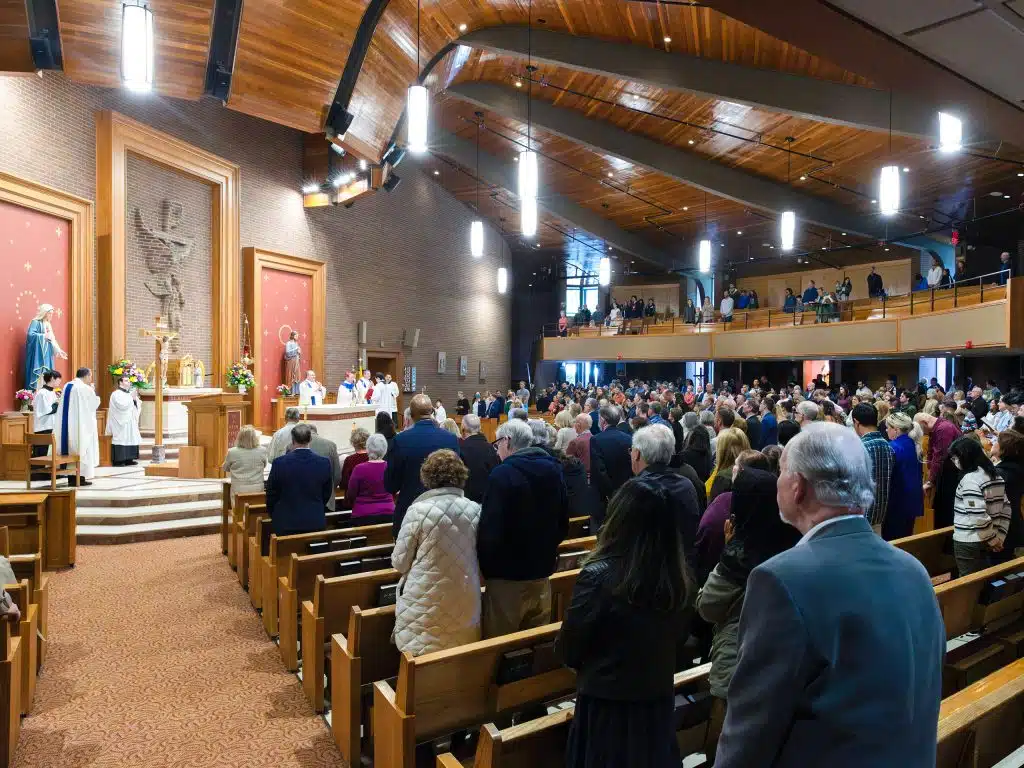St. Columba is the patron of everyone involved in the book publishing business, but he could also be invoked against copyright infringement.
St. Columba was born a prince of the O’Donnell clan of County Donegal in northwest Ireland. Like so many Irish Christians of this period St. Columba was an avid collector of beautiful books. Not long after he was ordained a priest, St. Columba called on St. Finnian, abbot of Clonnard Abbey. St. Finnian had just returned from Rome, and he had brought home with him a copy of St. Jerome’s translation of the Psalms. With its superb hand-lettering and border decoration, each page was a work of art. As St. Columba turned the pages of this treasure, he knew he had to have it. So every night, after St. Finnian and his monks had gone to sleep, St. Columba sat up making an exact copy. He had just finished when St. Finnian got wind of what his guest had been up to. Since he had not authorized any replica to be made of his book, St. Finnian demanded that St. Columba hand over the copy. St. Columba refused. The two saints’ argument grew heated, until some of the monks stepped in and suggested that the case be arbitrated by Diarmaid, Ireland’s high king.
Off St. Finnian and St. Columba went to the king’s court where each presented his side of the argument. Diarmaid considered the case for a time and then pronounce his sentence. “To every cow its calf,” he said, “and to every book its copy.” Barely able to conceal his rage, St. Columba surrendered the copy to St. Finnian. Now he nursed a double grudge – against St. Finnian and against Diarmaid.
Back in his own territory St. Columba summoned all the chiefs and warriors of the O’Donnell clan. In the midst of the assembly he made a rousing speech, claiming that the king and the abbot had insulted him, that the honor of the O’Donnells was at stake. Stirred up by their kinsman’s fiery oratory, the O’Donnells went to war against Diarmaid and St. Finnian. On a plain in Donegal beneath a mountain called Ben Bulben the two armies met. The O’Donnells inflicted a crushing defeat on St. Columba’s enemies, leaving 3000 dead on the field. In O’Donnell country the fight was regarded as a great victory, but in the rest of Ireland St. Columba’s private war did not play so well.
At a special synod called to discuss the case, the bishops and abbots agreed that if every thin-skinned priest went to war every time he felt his pride had been wounded, Ireland would be slaughterhouse. Most of the churchmen at the synod wanted to make an example of St. Columba by excommunicating him. St. Brendan, however, urged the reverend fathers to impose a less severe penalty. Persuaded by St. Brendan, the synod voted to exile St. Columba from Ireland for life. Furthermore they commanded him to convert 3000 pagans – one for each man who died in Columba’s war.
The penalty of leaving his home forever brought St. Columba to his senses. Repentant and obedient he sailed for Iona off Scotland’s western coast. From this island St. Columba launched a mission to the Picts that, by the end of his life, brought many more converts into the Church than the 3000 the synod demanded.
Craughwell is the author of numerous books about the saints, including Saints Behaving Badly (Doubleday, 2006).


The Good Shepherd